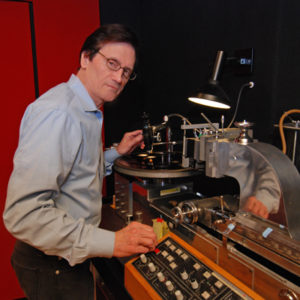 The name Bernie Grundman is synonymous with Mastering. His world renowned facilities, responsible for a consistently large percentage of chart recordings, were launched in 1984, following Grundman’s 15-year tenure with A&M Studios. In 1997, Grundman opened his Tokyo mastering studios and in 1998 relocated to expanded facilities in Hollywood.
The name Bernie Grundman is synonymous with Mastering. His world renowned facilities, responsible for a consistently large percentage of chart recordings, were launched in 1984, following Grundman’s 15-year tenure with A&M Studios. In 1997, Grundman opened his Tokyo mastering studios and in 1998 relocated to expanded facilities in Hollywood.
Grundman was born in Minneapolis, Minnesota, and moved to Phoenix, Arizona, at the age of eight. As a teenager, he was a hi-fi enthusiast and worked part time as a drummer for various groups throughout the city. By the age of 19, he owned and operated a jazz club. In 1965, after serving in the Air Force Electronic Countermeasures Division, he started working for a small studio in Phoenix as a second engineer. In 1966, Grundman moved to Los Angeles where he became a mixer, mastering engineer and maintenance technician for the studios of the highly respected Contemporary Records label. In 1968, he started A&M’s mastering division, one of the top operations in the industry.
Mastering is described by Grundman as “basically post-production for the recording industry — the final creative step before delivery to the manufacturer for mass production.” To accomplish his work, today’s top mastering engineer utilizes a specialized console with both analog and digital signal processors and a computer workstation for editing and sequencing. Grundman technology sets the digital streaming and CD standard today, but Bernie is still an expert with the LP cutting lathe.
Bernie Grundman Mastering in Hollywood is a complex of six studios, including dedicated 5.1 Surround and Lacquer Cutting rooms. Virtually any analog or digital format can be played back thanks to a deep inventory of modern and legacy equipment. The facility provides high quality vinyl masters, pre-masters for CD, and file masters for standard and high-resolution digital distribution and streaming.
Grundman’s custom mastering consoles and ancillary equipment are designed and built at their on-site technical shop. The consoles are discrete, dual bank, preview-program designs for proper lacquer cutting. The 24-band equalizers, limiters, etc. are integrated within the consoles as a wholistic implementation. All components can be bypassed for minimalist transfers. A host of digital audio workstations and software signal processing are employed. Modified ATR and Studer tape decks are available for playback and recording with both tube and discrete solid-state electronics. Modified Scully lathes are controlled by the Compudisk 80 mastering computers. Haeco/Westrex cutting heads are driven by either solid state or tube electronics. Monitors are Tannoy bi-amped systems with in-house crossovers driven by modified Crown DC-300 amps. The studios are crisp and functional with a gallery atmosphere featuring paintings by internationally known artist Claire Chene.
